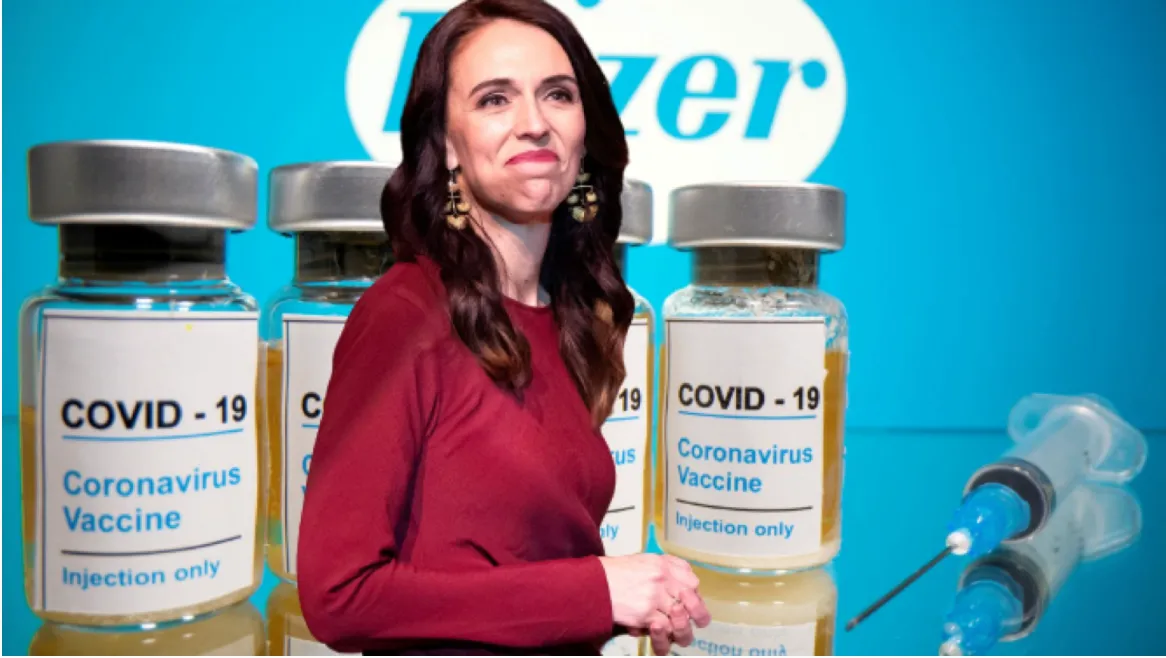Table of Contents
Jeremy Harris
When trying to find good information and data regarding the decision of whether to take the Pfizer vaccine that will be offered to the public, and having little faith in our government or media after the previous year, I decided to go directly to the source. I have been personally in touch via social media with scientists with expertise from across the debate, including lockdown sceptics – so they are hardly shills for the pharmaceutical companies.
Here are the facts, as I best understand them as a layman, straight from the source (as they say) about how the synthetic mRNA vaccines work:
- The synthetic mRNA is very unstable. The main problem they have had developing this technology is keeping the mRNA intact until it can reach your cell and can generate the required proteins (in this case the spike protein).
- All the synthetic mRNA injected into you breaks down very quickly (in less than 24 hours).
- The synthetic mRNA cannot change your genes. It uses your body’s existing protein-creating apparatus to generate proteins. Some people are claiming that the mRNA can change your genes if the spike protein enters your nuclei or embeds in your cell membranes; however, the chances of this are exceedingly low (essentially zero).
- Once all the synthetic mRNA is exhausted, your body disposes of the broken down synthetic mRNA and generated proteins (in this case the spike protein) via your body’s normal processes (including via your immune system’s response to the spike protein).
- While theoretically, it is possible that the synthetic mRNA could be targeted to specific cells, this is not the case with this vaccine, meaning any cell in your body could produce the spike protein.
- Additionally, antibody-dependent enhancement is a “valid concern”, as is “the lipid nanoparticles which do have some issues with toxicity/immunogenicity, perhaps mostly connected with their incorporation of PEG, which has been linked to anaphylactic shock” – I am directly quoting a PhD here. Unfortunately, I could not get accurate data on how big a risk these factors are, or whether they are likely to manifest at all, or as short or long term effects, and if both, in what proportion.
With the above mode of action clarified, how should one think about the decision to get vaccinated or not?
In my opinion using an empirical risk based assessment choosing the option with the lowest risk via the below equation:
Risk of death, short term effects, long term effects from the virus = Risk of death, short term effects, long term effects from the vaccine
We have numbers for all of the below risks, except the long term effects of the vaccine.
- Death from virus: The Infection Fatality Rate for the virus in countries like NZ is ~0.3%-0.4% with a massively age-stratified risk for the old and infirm; the average age of death globally is ~81.
+
- Short Term Viral Effects: Symptomatic cases usually last up to a few weeks, manifesting usually as a respiratory illness (of varying severity) with relatively unique symptoms. About 10% of symptomatic cases (which are approximately half of all cases) experience post-viral syndrome (annoyingly called long Covid – it’s actually nothing new) and over 95% of post-viral syndrome cases are resolved within 12 weeks after minor symptoms.
+
- Long Term Viral Effects: Given the above and a herd immunity threshold of 60%, far less than 0.5% of the population will experience post-viral syndrome longer than 12 weeks and the majority of these people will be the elderly and infirm who were hospitalised.
=
- Death from the vaccine: The (maximum possible) Fatality Ratio from the vaccine is currently running at a reported rate of about 0.008% and the average age of death is just under 78 from the adverse effect data recorded in vaccine adverse event reporting systems in the US (VAERS), the EU (EUDRA) and the UK (MHRA). These are the national reporting systems in these countries, similar to our CARM. This is approximately 3,000 deaths from 35,000,000 mRNA vaccines given. Remember that people die, and statistically many people will simply die within a short period after getting a vaccine of other causes, so although it is estimated that only 1% of adverse effects get reported in the above systems, almost all of the non-reported effects will be minor, so some percentage of the 0.008% fatality ratio and 3,000 deaths will be due to other causes. These are likely the maximum numbers and the actual ratio will become clear over time.
+
- Short Term Vaccine Effects: Most of these are very short term in nature (i.e. fully recovered in less than a week); however, they do seem more severe than those from vaccines developed over longer periods, for example with some people requiring multiple days of bed rest after vaccination (this is conjecture based on reporting but has been echoed by numerous scientists I follow).
+
- Long Term Vaccine Effects: By definition at this point in time, only months after mass vaccination has begun, long term effects are unknown. The full trials for this vaccine do not finish until 2023; this is the timeline we would be following if we (and the rest of the world) had followed our original pandemic plans based on the previous century of actual science. On the two occasions that emergency use for vaccines have been used during panics in the past (2009 Swine Flu Pandemrix vaccine approval and the 1976 US Flu Vaccine debacle), both led to a number of cases of severe long term side effects (namely narcolepsy and Guillain-Barré syndrome) that only manifested months or years after vaccination, articles below:
In my non-expert opinion: the worrying prior history of emergency use vaccines, the “valid concern” of antibody dependent enhancement and the use of lipid nanoparticles, as well as the other risk data above, leads to a simple conclusion: those at high risk should be vaccinated if they choose (and therefore protected as much as possible) and those who are at very low risk should wait until 2023 until the trials are concluded and the long term risks are known. Where you fit into these two categories is subjective, based on your risk factors and appetite for risk. In the meantime the young, healthy and unvaccinated should take all precautions against the high risk until we reach herd immunity after the borders reopen.
With this said, the data at this point very strongly indicates that the vaccine reduces the chance of death and serious outcomes at all ages, so if the small risk of long term effects doesn’t worry you, then you will be reducing your chance of death and hospitalisation if you take the vaccine.
Personally our family is in the lucky position (young and relatively healthy so the risk from both the virus is effectively zero) where we can wait until 2023 (when we will know there if there are any long term effects, and if so, how serious and prevalent they are) at a low level of risk and then we will take the vaccines if proven safe enough in the long term (mainly because they will likely be required for travel).
The risk to us from the virus is just so low (and will be for many years to come) that a vaccine with any long term risk at all doesn’t really make sense as we would have likely have had a natural infection by then. But if the world is requiring vaccines to travel in another few years and the risk of long term effects is low, then needs must.
Ultimately the risk of death for us will be reduced if we take the vaccine; however, the risk of death by the infection is still so low we are happy to take that increased risk to buy time to get more information about the long term effects of the vaccine – which could potentially be more serious in nature than a case of long term post viral syndrome even if there is a lower percentage of bad long term vaccine outcomes.
This mental math is a bit complicated but what I’m saying is that apart from death, the worst viral outcome seems to be a syndrome where the main symptom is fatigue, while a bad adverse long term vaccine outcome is usually neurological or autoimmune in nature. We are also responsible enough that if we are naturally infected and symptomatic (when almost all transmission occurs and occurs indoors) then we will voluntarily isolate to protect more vulnerable people.
In my personal (and most definitely non-expert) capacity I am encouraging those we know over 65 to get the vaccine, as on a risk/reward basis as outlined above the case for the vaccine (in my opinion) is overwhelming. If you are under this age and have co-morbidities I also think (in my layman’s opinion) you should strongly consider it too, as well as if you want to reduce your chance of death and hospitalisation at any age and are satisfied you have enough data about the short and long term risks of the vaccine versus the virus now. Ordinarily I would say don’t take my word for it, ask your doctor, but doctors in general don’t seem to be thinking critically on this issue. So I will say don’t take my word for it, ask your doctor, but also do extensive research and then take your own word for it.
Remember when weighing up the decision the chance of death from Covid-19 increases exponentially with age, so as your age increases the chance of death or serious illness increases non-linearly. So age should be your primary factor when considering your decision, followed by any co-morbidities you may have.
However, ultimately, it is a subjective and individual choice based on the risks and rewards that are most meaningful to you.
A very close family member of mine whom I love will not get the vaccine, and given his various serious ailments, I estimate his chance of death from a Sars-Cov-2 infection at 6%-8%, dropping to almost zero if he takes a vaccine and it generates an immune response; but that is his choice. I support him as the principles of medical and individual freedom are more important than people making what others deem are the correct decisions.
I’m sure many people are already thinking this way, but I hope the above information helps in clarifying your decision in your mind. Remember I’m just some guy and the above reflects what I believe is correct based on info from the best minds I could find and what makes sense to me. Ultimately though, on this issue we really are all on our own.
Please share so others can discover The BFD.









